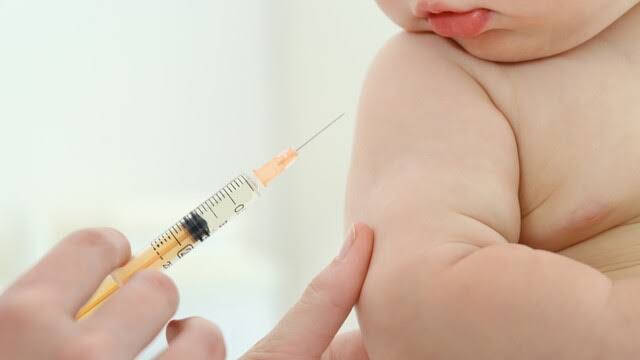After the birth of the baby, your hospital would provide you with a vaccination schedule. Vaccinations should be taken as per the schedule. If missed there is a risk for the baby to acquire serious illnesses. And in case if the schedule is missed, it is important to approach your doctor immediately to discuss how to catch up with the scheduled vaccines. Have a look below to know common vaccines given to your baby until age 2 and against what diseases they protect.
At Birth - BCG is the first vaccine given to the baby right after birth. It protects the baby against tuberculosis which is one of the major infectious diseases in India. Along with that Hep B1 vaccine is given to protect against hepatitis b infection which is a serious liver infection. The third vaccine which is given at first is OPV (Oral Polio Vaccine). Though OPV can be taken within 15 days post- birth, the sooner it is given, the higher the immunity against polio.
At 6 weeks - DTwp or DTap1 is given to protect against tetanus, diphtheria and pertussis. Diphtheria, and pertussis are diseases that affect the lungs while tetanus affects the muscles. The Hib-1 vaccine is also given to protect against Haemophilus Influenza virus which can cause serious brain infections like meningitis. It could also cause pneumonia. IPV-1 is the first dose of polio vaccine which is given through injection. Hep B2 is the second dose of vaccination against hepatitis b. PCV 1 and ROTA 1 are given to protect against pneumococcal and rotavirus infection respectively.
At 10 weeks - A second dose of TDP vaccine (DTwp/DTaP2), a second dose of Haemophilus influenza (Hib-2), a second dose of polio vaccine (IPV-2), third dose of hepatitis b (Hep B3), and second dose of pneumococcal and rotavirus (PCV 2 & ROTA 2) is given.
At 14 weeks - The third dose of TDP vaccine (DTwp/DTaP3), third dose of Haemophilus influenza and polio vaccine (Hib-2 & IPV-3), fourth dose of hepatitis b (Hep B4), and third doses of pneumococcal and rotavirus vaccines (PCV3 & ROTA 3) are given.
At 6 months - The first dose of vaccination against influenza (Influenza 1) is given. You must be aware that Haemophilus influenza and influenza are not the same. Influenza is the major cause of death (90 percent) due to infectious diseases in India. Vaccination against typhoid can also be taken anywhere between 6-9 months.
At 7 months - A second dose of influenza vaccine (Influenza 2) is given. The influenza vaccine is expected to take once a year till 5 years of age in premonsoon period.
At 9 months - MMR 1 vaccination against mumps, measles, and rubella is given. These are serious viral infections that spread in the air and cause complications like brain damage or even death. So it is important to get vaccinated against these diseases.
At 12 months - Hepatitis A-1 is given against hepatitis A infection. It is also important to know that hepatitis A is different from hepatitis B. If not vaccinated against hepatitis A there is a high risk of having hepatitis A since it spreads easily through contaminated food and water and results in liver infection. Anywhere between 12-15 months 4th dose of PCV (booster dose) can be taken.
At 15 months - A second dose of vaccination against mumps, measles, and rubella (MMR 2) is given. Along with that Varicella vaccine is given to protect the baby against chickenpox.
At 16 -18 months - A booster dose for Tdp, Haemophilus influenza, and polio(IPV) can be taken.
At 18-19 months - A second dose against chickenpox (Varicella 2) along with a second dose of hepatitis A vaccine (Hepatitis A-S)

